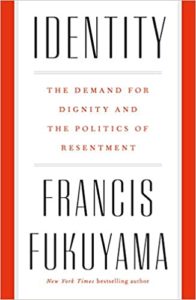
For now, the frenzied strategy of protecting lives, especially the vulnerable which includes seniors and those with existing health issues is paramount. But before too long we will witness a barrage of acerbic exchanges between the political left and right about whose fault it was that the U.S. was ill-equipped to handle this global health crisis. Even right now there is social pressure to avoid using the politically incorrect term “Chinese virus” in referring to the coronavirus responsible for the disease COVID-19 rampaging the world. Welcome to identity politics.
Francis Fukuyama, author of Identity: The Demand for Dignity and the Politics of Resentment does a brilliant job of tracing the origins of our current political landscape which is mired in identity politics. Fukuyama argues that our political sense is ultimately grounded in the inner self being recognized. Society, he theorizes, will align themselves around groups which can mutually recognize and affirm one another’s identity.1 This identity, according to Fukuyama, is rooted in Emmanuel Kant’s understanding of one’s ability to make choices based on reason. Couple this with Jean-Jacques Rousseau’s concept of identity being premised on suppressed personal feelings and experiences, then one’s political aim becomes the “recovery of the authentic inner being, and society’s recognition of the potential that resided in each of its members.”2 Given human nature, Fukuyama thinks there simply is no avoiding identity politics.3 But it does not necessarily mean it’s a bad thing so long as citizens diligently work to preserve mutual respect for each other.
Political pundits in the United States may have to start rethinking the predominant attitude of voting along party lines. The recent rise of nationalist leaders, U.K. leaving the EU and the election of Donald Trump are disturbing the political status quo and may be a harbinger for the way an entire generation views politics. Take for example Trump’s political ascent to become the 45th president of the United States in 2016. Hardly anyone expected that outcome. What is even more surprising was the demographic that played a key role in swaying the election in Trump’s favor: 18 – 29-year olds; and they are now a larger percentage of voters than those over 65.4 How did this happen? According to GenZ expert Jean Twenge, one has to answer this question: What do Bernie Sanders and Donald Trump have in common? The answer: both are political independents.5 Twenge has observed party affiliation among GenZers is falling by the wayside and instead describe themselves as liberal, moderate or conservative. In the end Trump won over Hillary because members of GenZ thought his policies fit their worldview better.
Fukuyama is certainly correct in concluding that “identity can be used to divide, but it can and has also been used to integrate.”6 For a new generation it’s an identity that returns to the individual that is reluctant to affiliate with factions and follow their rules. They are weary about traditional partisan politics and the widening polarization in America. What they long for is authenticity and transparency in our institutions and government. I am no prophet but I have an optimistic feeling members of GenZ will make great attempts at changing the world for the better, and many will succeed.
- Francis Fukuyama, Identity: The Demand for Dignity and the Politics of Resentment (New York: Farrar, Straus and Giroux, 2018), Loc. 106, Kindle.
- Ibid., Loc. 1320.
- Ibid., Loc. 2313.
- Jean M. Twenge, iGen: Why Today’s Super-Connected Kids Are Growing Up Less Rebellious, More Tolerant, Less Happy—and Completely Unprepared for Adulthood (NY: Atria Books, 2017), Loc. 3600, Kindle.
- Ibid., 3613.
- Fukuyama, Loc 2552.






